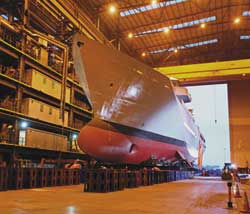VT opts out of shipbuilding business
29 Jan 2009
 VT Group, the UK defence services giant, said on Wednesday that it would sell its 45 per cent share in its joint venture, BVT Surface Fleet to its partner BAE Systems. This would end the 149-year association of Hampshire-based VT (formerly Vosper Thornycroft) with the UK shipbuilding industry.
VT Group, the UK defence services giant, said on Wednesday that it would sell its 45 per cent share in its joint venture, BVT Surface Fleet to its partner BAE Systems. This would end the 149-year association of Hampshire-based VT (formerly Vosper Thornycroft) with the UK shipbuilding industry.
 VT said in a statement that BAE Systems would acquire the stake under an option in its partnership agreement. BVT is currently involved in building two aircraft carriers for the UK ministry of defence, and six Royal Navy Type 45 destroyers worth one billion pounds each. All future and ongoing projects will continue to be produced by BVT, although the operation will now be wholly owned by BAE Systems.
VT said in a statement that BAE Systems would acquire the stake under an option in its partnership agreement. BVT is currently involved in building two aircraft carriers for the UK ministry of defence, and six Royal Navy Type 45 destroyers worth one billion pounds each. All future and ongoing projects will continue to be produced by BVT, although the operation will now be wholly owned by BAE Systems.
A spokesman for VT said: "The group has the right from July 1, 2009, to put its shareholding in BVT to its joint venture partner, BAE Systems. The group has decided to exercise the option, which requires UK Ministry of Defence approval in addition to the approval of VT Group's shareholders and other regulatory bodies."
He added that the move will allow VT to refocus and expand its core engineering and support services businesses. The MoD is understood to have already approved the sale. BVT employs more than 7000 people and generates a turnover of £1billion a year.
BVT Surface Fleet was created in June 2008 when BAE and VT agreed to combine their warship construction and support operations. A spokesman for BAE Systems said: "VT were always in this joint venture for a one to three-year period. They have simply decided to exercise their right to exit after one year. As far as we're concerned, nothing has changed. We are looking forward to cutting steel for first aircraft carrier this summer. We are at the head of an industry that is at its most vibrant in years."
Paul Lester, chief executive of VT Group, said he expects to double the size of the company in the next five years once it has exited its naval shipbuilding activities to focus on support services. The "new VT" – which is expected to have annual revenues of £1.1 billion-£1.2billion once it has sold its share in a shipbuilding venture – would grow both organically and through acquisition, he said. The company is also examining whether it can transfer from the aerospace and defence sector to the support services sector, whose companies traditionally enjoy higher ratings.
"If you look at our track record over the past five-six years, we achieved 20 per cent per annum growth in support services, a mix of organic and acquisitive growth," he said.
VT's shipbuilding activities, which it is now shedding, represented about 20 per cent of last year's turnover of £1.2 billion, and just under 18 per cent of underlying profit.
The decision to exit soon was prompted by opportunities perceived in the tough economic climate. "In the current environment, having cash on the balance sheet puts us in a strong position to acquire businesses that we think will become available in the next 12-18 months," Lester said.
The company was looking to expand in the UK and the US, primarily in the defence market. In the US, "our current run rate is $550 million (£384 million) a year and we need to get that to $1 billion in revenue in the next two to three years."


















